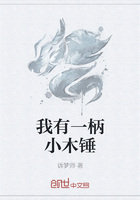"I don't know." She was barely audible; but she turned deliberately, and there took place an eager exchange of looks which continued a long while. At last, and without ending this serious encounter, she whispered:
"How far do YOU think?"
Mr. Corliss did not answer, and a peculiar phenomenon became vaguely evident to the girl facing him: his eyes were still fixed full upon hers, but he was not actually looking at her; nevertheless, and with an extraordinarily acute attention, he was unquestionably looking at something. The direct front of pupil and iris did not waver from her; but for the time he was not aware of her; had not even heard her question. Something in the outer field of his vision had suddenly and completely engrossed him; something in that nebulous and hazy background which we see, as we say, with the white of the eye. Cora instinctively turned and looked behind her, down the path.
There was no one in sight except a little girl and the elderly burgess who had glanced over his shoulder at Cora as she entered the park; and he was, in face, mien, and attire, so thoroughly the unnoticeable, average man-on-the-street that she did not even recall him as the looker-round of a little while ago. He was strolling benevolently, the little girl clinging to one of his hands, the other holding an apple; and a composite photograph of a thousand grandfathers might have resulted in this man's picture.
As the man and little girl came slowly up the walk toward the couple on the bench there was a faint tinkle at Cora's feet: her companion's scarfpin, which had fallen from his tie. He was maladroit about picking it up, trying with thumb and forefinger to seize the pin itself, instead of the more readily grasped design of small pearls at the top, so that he pushed it a little deeper into the gravel; and then occurred a tiny coincidence: the elderly man, passing, let fall the apple from his hand, and it rolled toward the pin just as Corliss managed to secure the latter. For an instant, though the situation was so absolutely commonplace, so casual, Cora had a wandering consciousness of some mysterious tensity; a feeling like the premonition of a crisis very near at hand. This sensation was the more curious because nothing whatever happened. The man got his apple, joined in the child's laughter, and went on.
"What was it you asked me?" said Corliss, lifting his head again and restoring the pin to his tie. He gazed carelessly at the back of the grandsire, disappearing beyond a bush at a bend in the path.
"Who was that man?" said Cora with some curiosity.
"That old fellow? I haven't an idea. You see I've been away from here so many years I remember almost no one. Why?"
"I don't know, unless it was because I had an idea you were thinking of him instead of me. You didn't listen to what I said."
"That was because I was thinking so intensely of you," he began instantly. "A startlingly vivid thought of you came to me just then. Didn't I look like a man in a trance?"
"What was the thought?"
"It was a picture: I saw you standing under a great bulging sail, and the water flying by in moonlight; oh, a moon and a night such as you have never seen! and a big blue headland looming up against the moon, and crowned with lemon groves and vineyards, all sparkling with fireflies--old watch-towers and the roofs of white villas gleaming among olive orchards on the slopes--the sound of mandolins----"
"Ah!" she sighed, the elderly man, his grandchild, and his apple well-forgotten.
"Do you think it was a prophecy?" he asked.
"What do YOU think?" she breathed. "That was really what I asked you before."
"I think," he said slowly, "that I'm in danger of forgetting that my `hidden treasure' is the most important thing in the world."
"In great danger?" The words were not vocal.
He moved close to her; their eyes met again, with increased eagerness, and held fast; she was trembling, visibly; and her lips--parted with her tumultuous breathing--were not far from his.
"Isn't any man in great danger," he said, "if he falls in love with you?"
"Well?"















